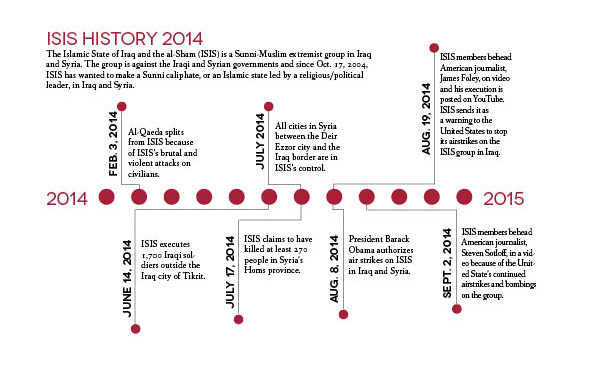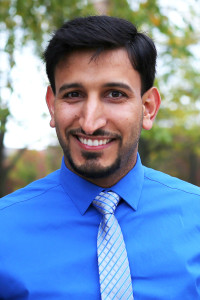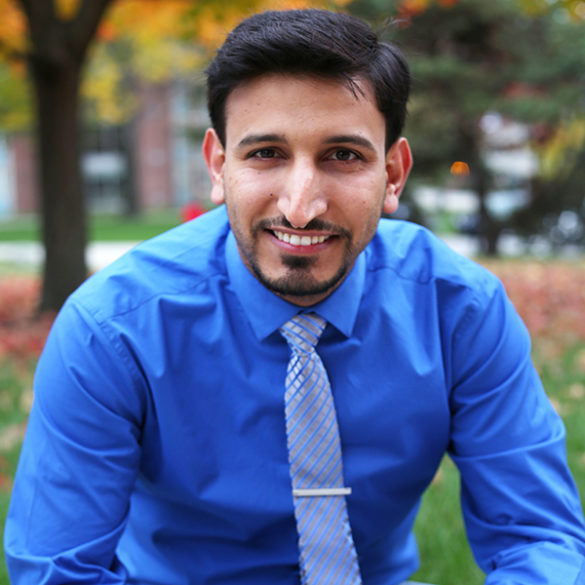In June 2014, Abbas Jammali was on his way to the U.S. Embassy in Baghdad to collect his visa and passport to attend Ball State.
“When I was going over [to the embassy], I saw ISIS killing Iraqi soldiers, behead them in front of me,” he said.
This is the Iraq he left behind.
The goal of Islamic State of Iraq and Syria is to re-create the Islamic state the way it was in the early decades after the rise of Islam, according to Yaron Ayalon, an assistant professor of history at Ball State.

“You really have to learn the history of things, especially with the case of ISIS where they keep referring to all sorts of events that took place in the seventh century. If you don’t start with the seventh century and the rise of Islam, you’re never going to understand ISIS,” Ayalon said. “If you really learn something from history, one of the things we know is that the early Islamic state is nothing like what ISIS claims it was.”
ISIS controls territory in Iraq and Syria and now rivals Al Qaeda as the world’s most powerful jihadist group, according to the New York Times.
Besides controlling land in the Middle East, the group is also known for killing dozens of people at a time and carrying out public executions, according to CNN. U.S. journalist James Foley was beheaded August 19 and Time magazine contributor Steven Joel Sotloff on September 2.
Sitting in his apartment, Jammali, a first year masters student in physics, talks to his family via Skype as part of their daily ritual of communication, despite the eight-hour time difference.
He often avoids talking about ISIS with his parents because they are already worried enough.

“Our government sometimes blocks the Internet network to make it difficult for ISIS people to contact each other,” Jammali said. “The Internet in Iraq is not good. Sometimes I can’t understand everything [my family] is talking about.”
Jammali is from Karbala, an hour and a half drive south of Baghdad. He said ISIS members are difficult to spot in major cities like Karbala.
“[My family] is mostly in danger because ISIS people are not like a regular army because you can see them and hide somewhere,” Jammali said. “ISIS people are just people. They wear civilian clothes.”
Ahmed Jamal, also accepted to Ball State on a full-ride scholarship, was out to pursue a master’s in computer science. After his mother got sick and ISIS invaded, Jamal decided to stay in Iraq. He said he couldn’t leave his family alone for two years with the terrorist threat closing in on his home city of Baghdad.
“They still have not taken over the city yet, but they are only a few miles away from Baghdad right now,” Jamal said. “Their explosive cars are still hitting the city every single day. Though just last week, three cars exploded one block away from where I live, targeting simple workers that were having their lunch in a restaurant.”
ISIS is labeled as a “terrorist” group, but terrorism is difficult to define, according to Francine Friedman, a professor of political science at Ball State.
“Even the American government has no hard and fast definition,” Friedman said. “The Department of State has one, the Department of Defense has one [and] the FBI has one.”
Friedman teaches a course titled politics of terrorism, which wasn’t an available course at Ball State until after 9/11. Despite not having a concrete definition, students in the class learn what aspects define terrorism.
She said it’s often politically motivated and used to strike fear into a population of innocents.
This fear is the result of living with daily explosions in Iraqi cities, which typically leads to severe injuries and death. These first-hand experiences trigger people like Jammali, who plans to live in the U.S. permanently.
“Everyday we have explosions, everyday kidnapping, everyday everything which is bad,” Jammali said. “We are looking for safe. We are not looking for something more than that.”
Still in Iraq, Jamal and his immediate family refuse to leave because there is no place they could live in peace. Many of his family and friends have fled to Turkey and Jordan for fear of physical harm from explosions.
“What most people don’t realize though is that protecting yourself physically isn’t the hardest thing while living in Iraq,” Jamal said. “It’s so much harder to protect your mental health by not allowing negativity and fear to take over your mind and lead your life.”
Terrorist groups often use fear as a weapon of control toward a population and also when recruiting new members. There are certain factors that influence the people who end up joining a terrorist group according to Friedman.
“There is all sorts of research about that [motivations for becoming a terrorist], saying that some people may be ideologically motivated, but most of them actually join it as a social choice because [their] family are already in it or friends are already in it,” Friedman said.
Understanding ISIS and the people who join the group is complicated. Everything won’t be fully understood until years down the road.
“Typically the right historical perspective is at least 20 or 30 years,” Ayalon said. “We can still try and interpret what we have now, but some things we will only understand 20 or 30 years from now. We just have to accept that.”
For now, Jammali prays every day for his family and friends in Iraq and for an end to ISIS in his home country.
“We have a hope,” Jammali said. “We don’t know what that hope will give us. We just have a hope.”




